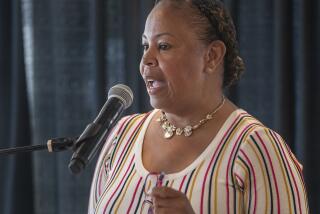AIDS Healthcare Foundation vs. L.A. County
How can anyone go wrong criticizing Los Angeles County government? It’s big, bulky and slow. Many of its data systems are locked in an outmoded paper-and-pushcart world, gumming up communication among offices and denying competent service to a large chunk of the county’s approximately 10 million residents. It breaks public meeting laws and withholds vital information.
The county’s assessor has been formally charged with multiple counts of corruption. Its jails have become known as horrific places that foster a culture of inmate abuse. Its sheriff has been found personally liable for his deputies’ beating of one inmate, his staff for the beatings of others, and more lawsuits are pending.
More than a few of the county’s probation officers have been arrested, some on suspicion of committing crimes as serious as those that have gotten their adult “clients” in trouble, others for allegedly having sex with the very juveniles they are supposed to be steering away from delinquency. The Department of Children and Family Services pulls too many children from loving homes and, at the same time, leaves in place too many who suffer abuse or even death.
So it’s easy to accept that the AIDS Healthcare Foundation is on to something with its campaign, unveiled this month, to “Stop LA Corruption.”
Lawsuits and news reports have shed a great deal of light on the county’s questionable practices, but the AHF is applying some heat as well. And a little heat can be a valuable thing, because without it, the light often goes unnoticed. It’s especially important right now, in advance of the elections that will be held in just over six months that will — or could — bring enormous change to the county’s Hall of Administration.
Assessor John Noguez will no doubt be gone after the election, regardless of the outcome of his criminal proceedings. Sheriff Lee Baca, who has faced enormous criticism over the last two years, is up for reelection and has drawn, so far, two serious challengers. And term limits mean successors for both Supervisor Gloria Molina, who has held the office for 22 years, and Supervisor Zev Yaroslavsky, who has been there for 19.
But the fact that the county has challenges and the assertion that a debate about them is important do not, by themselves, mean that anyone who takes up rhetorical arms against the county is automatically in the right. The AHF campaign may inadvertently stumble on some legitimate points, but the organization increasingly appears to be engaging in needless combat, perhaps to defend its own position as a county contractor.
Some background is in order. The Los Angeles-based AHF is a nonprofit that has provided badly needed health services first here and then around the world since 1987, and more recently has led efforts to require performers in adult films to use condoms on set (and presumably on screen) when engaging in most sexual acts. A 2011 city petition resulted in the City Council adopting a condom ordinance, but it could not be enforced without county participation. The AHF then led the charge for a county measure, which voters adopted a year ago. In the porn industry’s suit to block enforcement, a court upheld the law but invalidated the portion that required county officials to inspect film sets, severely limiting its ability to enforce the ordinance.
Between the public debate over the city measure and the campaign over the county version, the problem of sexually transmitted disease in L.A. came into sharper focus. The Times called for adult film performers to be protected, and condom use in adult films remains the responsible course of action — and is now the law. But it also became clear that the porn industry’s role, if any, in contributing to the spread of infection was minor compared with the real STD hotspots.
The county Department of Public Health’s Office of AIDS Programs and Policy is focusing, correctly, on untreated and often undiagnosed sexually transmitted diseases, especially among African American women in the county.
In the view of many county officials, the AHF’s condom campaigns have had less to do with stopping the spread of infection than with expanding a fight over its share of county contracts and resisting findings in a series of county audits that cast an unfavorable light on its performance and resulted in the withholding of $1.7 million.
Earlier this year, the AHF qualified an initiative for next June’s ballot to require the city of Los Angeles to sever its contractual ties with the county’s health department, and rapidly set up its own agency. But city officials are happy contracting the work out to the county, and the AHF’s arguments that a new city department would be more efficient — an argument that at first blush might seem attractive, given the county’s many challenges — are on closer inspection unpersuasive and appear to be just the latest salvos in the AHF’s unnecessary battle against the county. The county health department does generally good work, and the city can ill afford a new agency.
The initiative met with solid opposition (including lawsuits), so the AHF decided to move forward with yet another measure. It would require a city commission to oversee the public health service that the county provides and to study the feasibility of a separate city department.
Critics of the AHF, citing the county audits, have expressed concern that the nonprofit is oriented more toward self-promotion than treating and combating sexually transmitted disease. Medical staff have criticized its management and are involved in a union organizing drive.
“We’re David,” AHF President Michael Weinstein insists. “The county is Goliath.”
Los Angeles County is indeed more than a bit Goliath-like in its size — and even, to some (like the brutally beaten jail inmates), a bully. Fixing its problems will require some heat. But the AHF appears to be bringing only heat, and leaving the light behind.
More to Read
A cure for the common opinion
Get thought-provoking perspectives with our weekly newsletter.
You may occasionally receive promotional content from the Los Angeles Times.










